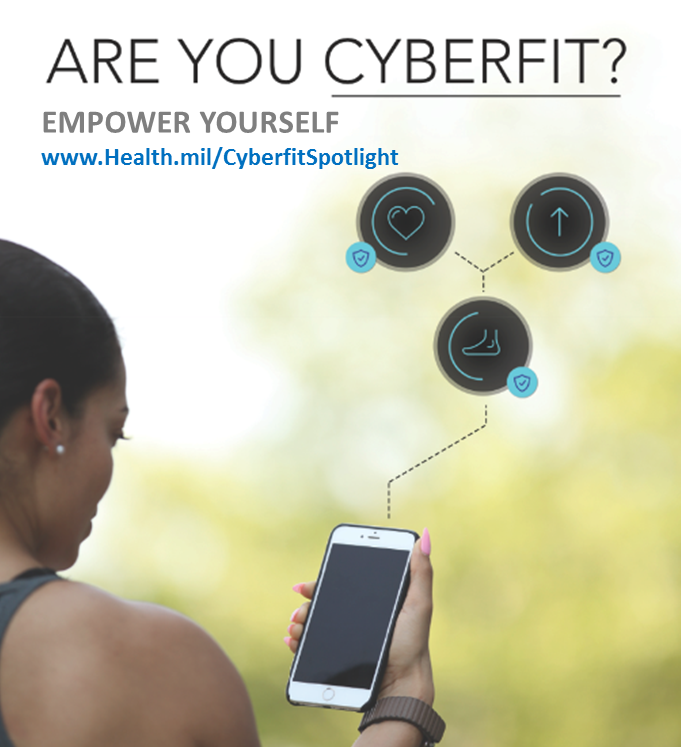Cybersecurity Awareness
 You can store and track your health and fitness information with fitness wearables, mobile devices, applications or other online services.
You can store and track your health and fitness information with fitness wearables, mobile devices, applications or other online services.
While this technology makes it easier for you to be in charge of your health information, it may increase the possibility that it can be stolen.
Only you can protect the health information under your control.
Make Cyber Fitness a Part of Your and Your Family's Daily Routine
Help your entire family understand that internet safety is a daily priority for their protection. Tell all your family members to follow the steps and tips below to be more “cyberfit.”
Step 1: Track Your Health Information Security
Are you storing health information in a fitness wearable or your mobile device? You need to protect it!
- Configure your device to be more secure
- Use a PIN or password on your device and set it to encrypt the internal storage and Secure Digital (SD) card
- Limit exposure of your mobile phone number
- Carefully consider what information you want stored on the device
- Maintain physical control of the device especially in public places
- Avoid using public Wi-Fi hotspots and unknown Wi-Fi networks
- Delete all information stored on a device before you discard it
Are you using a Mobile App? You should only download Apps from official app stores. If you let the app access your information, know what information it’s using. If you keep health information on an app, confirm with your medical provider that it’s recommended for securely storing your information.
Step 2: Protect Your and Your Family's Health Information Online
Take some precautions when you go online or use a mobile device:
- Create strong passwords that are different for each app and change them often. Never share them!
- If you store health information on your computer or mobile device, use a strong password that is different from your other passwords to help protect the information if your computer is lost or stolen.
- Use reputable, updated virus and malware protection software.
Do you store your health information online? Make sure you know the website’s privacy policy and service terms. If you store your health information on your computer or mobile device, keep it in password protected files or on external hard drives.
Step 3: Share Your and Your Family's Health Information Carefully
Your health information contains your social security number, identification numbers and contact information. These details can be used to steal your identity or commit health care fraud.
- Always validate the authenticity of a request for your medical information before you share it.
- Don’t give out more information than necessary, such as your driver’s license or social security number.
- Avoid sharing your information through an unsecured e-mail account or website.
- Use a secure messaging internet portal officially endorsed by your doctor’s office, if it’s available, to exchange health information.
- Protect yourself from healthcare fraud by checking your medical and insurance statements carefully. Notify providers and credit institutions if you think your information has been compromised.
Quick Tips to Remember
These tips will help you keep all your and your family's personal information safe online.
Don't be a Victim of Phishing
- Don’t reply to e-mails or texts that request your personal or medical information.
- Don’t open e-mails or click on links contained in e-mails from an unknown source.
- Use two e-mail accounts, one for health and financial information and the other for social media. Use different passwords for each account.
When You're Social, You're Global
Remember, it’s the world-wide web, not the private web. Protect yourself and use the internet wisely.
- Think carefully before posting anything on the internet that you don’t want shared.
- Social media and websites can be hacked.
- Your internet searches and website visits can be tracked by others who want your information for their personal and financial gain.
- Consider using a fictitious name if you interact in a health-related chat room.
Using Public Wi-Fi? Use Caution!
Wi-Fi hotspots are convenient, but not usually secure. You should avoid using public Wi-Fi hotspots and unknown Wi-Fi networks. If you do connect to a public Wi-Fi:
- Protect your information by using websites that are fully encrypted.
- Don’t share your personal health and financial information.
- Don’t use mobile apps that contain your personal health or financial information.
Last Updated 9/4/2025

